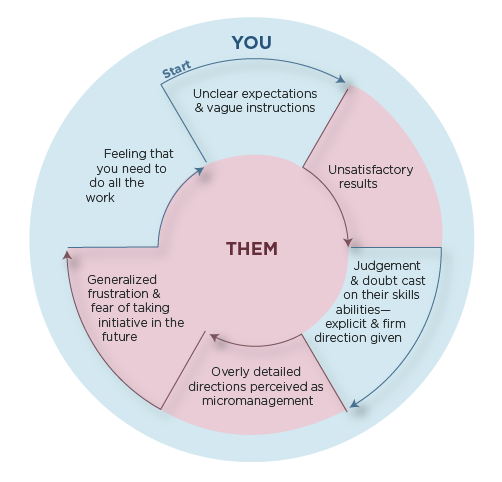Installment 1—The “Why Can’t They Just…?” Problem
ARTICLESCORPORATE CULTURELEADERSHIP
Sarah Kesher


We’ve all said it before: “Why can’t they just… listen? Learn? Pay attention? Have the skills we need? Say the right thing to the client?” I know I have. You can fill in the blank with whatever’s driving you nuts this month/day/minute.
I was reminded of this recently when I was asked
to speak with a group of executives about their
struggles with “finding good people.” After a little
digging, it turned out they weren’t actually
struggling to find talent, but rather with hiring
people only to end up disappointed by them after
they’ve settled in.
I’ve seen this play out so many times, and it almost always comes back to that same old phrase: “Why can’t they just…?” Of course, the question of “why can’t they just…?” isn’t actually a question. It’s a statement of frustration. And it almost universally means that what you thought would make your life easier, is not. But at the same time, it’s very telling. The two key words here are “they” and “just.”
“They” puts the blame entirely on the employee.
“Just” implies the expectation is so obvious and simple that the only explanation for not meeting it is incompetence or something otherwise wrong with them (hint: it isn’t).
Here’s the hard truth: “Why can’t they just” is a diversion. It’s an attempt to skip past our own accountability. It’s essentially saying: “I wish I could wave a magic wand and people would do things exactly how I would do them, without me having to lift a finger.” Newsflash: no magic wand exists. And if you want people to perform in a way that meets your expectations, you’re going to have to own your part in setting the stage.
What’s Really Going On Here?
We all think we’re being clear, but more often than not, we’re being clear because it makes sense to us. That usually doesn’t translate 100% for them.
Human dynamics are complex, sure. But when it comes to employee performance disappointment, one pattern shows up over and over: unclear expectations. We all think we’re being clear, but more often than not, we’re being clear because it makes sense to us. That usually doesn’t translate 100% for them. When those unspoken or poorly communicated expectations meet reality, here’s what tends to happen:
“Why can’t they just… listen? Learn? Pay attention? Have the skills we need? Say the right thing to the client?” Fill in the blank with whatever’s driving you nuts this month/day/minute.


©2025 Sarah Kesher Consulting, L.L.C.
Sound familiar? As this cycle continues, it bores its way deeper and deeper into your corporate culture. And, if you add a dash (or more) of shame in mix, it can be especially toxic. The good news? This is a cycle you can break.
In the next installment, I’ll break down this High Expectations to Disappointment Cycle and show you exactly how it embeds itself into your company culture — and more importantly, how to stop it in its tracks.
Coming Up Next: Installment 2: Understanding the High Expectations to Disappointment Cycle
#LeadershipDevelopment #EmployeeEngagement #OrganizationalCulture #WhyCantTheyJust




